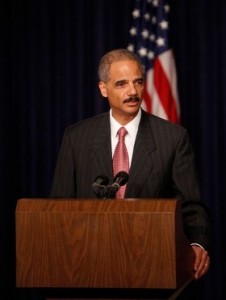A House panel voted Wednesday to hold Attorney General Eric Holder in contempt of Congress for failing to cooperate with a congressional inquiry into Operation “Fast and Furious,” just hours after President Obama asserted executive privilege to hide potentially incriminating documents about Holder.
 Voting along party lines, the House Oversight and Government Reform Committee voted 23-17 to hold Holder in contempt for failing to disclose documents and be honest about his knowledge and involvement in the operation carried out by the Bureau of Alcohol, Tobacco, Firearms and Explosives between 2009 and 2011.
Voting along party lines, the House Oversight and Government Reform Committee voted 23-17 to hold Holder in contempt for failing to disclose documents and be honest about his knowledge and involvement in the operation carried out by the Bureau of Alcohol, Tobacco, Firearms and Explosives between 2009 and 2011.
The operation facilitated the sale of weaponry to Mexican drug cartels in a flawed effort to locate criminals. Over 2,000 guns went virtually unaccounted for and the guns ended up at deadly crime scenes on both sides of the border.
The Committee’s vote will be reported to the full House, where a floor vote has been scheduled for next week unless Holder hands over the documents before then. Holder wants the documents hidden from the public and Congress, presumably, because they would expose his lies, while under oath, to Congress last year.
President Obama decided early Wednesday that he would invoke executive privilege to keep some of Holder’s documents secret. This was done upon Holder’s formal request. But asserting executive privilege is only legally allowed under certain conditions, which many argue are not met in this case.
Rep. Darrell Issa (R-CA), along with other members of Congress, are skeptical of Holder’s testimony last year that he had known about the program for only a few weeks, while Republicans say that memos show he knew of the program as early as July 2010.
The wisdom of dispersing arms and deadly weapons to violent Mexican drug cartels has been questioned, especially since the violence associated with these groups has been on a dramatic rise as of late.
Adding to the heightened militaristic nature of the drug war, the primary US efforts at curbing drug production, trade, and violence has been to empower Latin American armies and paramilitary groups and expand domestic law enforcement roles to abusive new levels. This, of course, has had deadly results.


